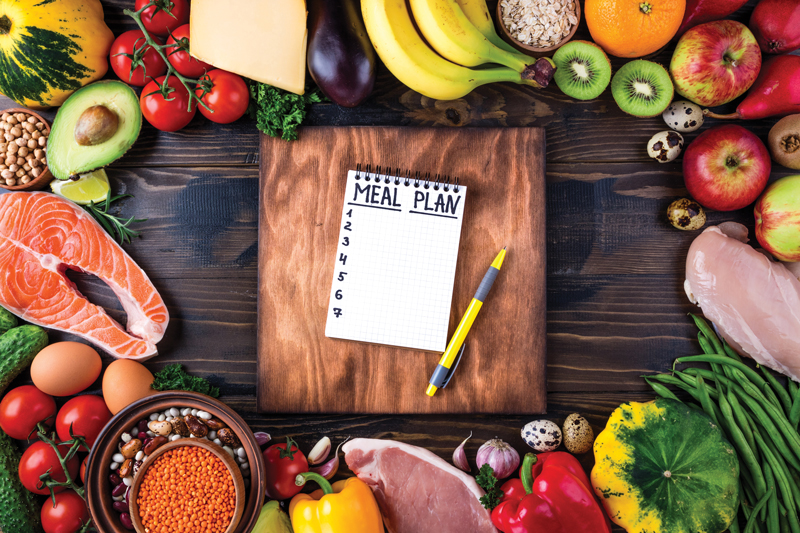Learn to Love Meal Planning
 During a first session, a client complained that her food world was in complete disarray. She didn’t really have any idea what or when she was going to eat from moment to moment. As homework, I recommended that she work on crafting a meal plan for herself. The client responded by saying, “Gosh, I really can’t think through what I want to eat for the next week or even the next few days. That’s way too much work.” I realized that she had confused a daily menu with a meal plan. It’s a common misunderstanding and I thought it worthy to the differences and walk through a meal planning process.
During a first session, a client complained that her food world was in complete disarray. She didn’t really have any idea what or when she was going to eat from moment to moment. As homework, I recommended that she work on crafting a meal plan for herself. The client responded by saying, “Gosh, I really can’t think through what I want to eat for the next week or even the next few days. That’s way too much work.” I realized that she had confused a daily menu with a meal plan. It’s a common misunderstanding and I thought it worthy to the differences and walk through a meal planning process.
What is a meal plan?
A meal plan simply provides a skeletal framework for how meals play out in your daily life while a menu is “meat upon the bone” so to speak. For instance, a meal plan may specify a certain amount of “protein” at lunch, while a menu may specify “cheese” on Tuesday and “black beans” on Wednesday. A meal plan can help define when you visit the grocery store on a weekly basis and help clarify when and how food is prepared. Let’s walk through a sample process to demonstrate how it works.
- Grocery Shopping: The first question to ask is when can I go grocery shopping on a weekly basis. If you pick a day and a time that you go, it will ensure that you readily have healthy supplies in your house.
- What Do I Buy: Whole foods, fresh vegetables, healthy proteins, and fats (i.e. olive oil, coconut oil, nuts, avocado). Add fresh fruit, good herbs, spices, and whole grains. Avoid products with added sugar, flour products, and processed foods as much as possible. As Michael Pollan, author of The Omnivore’s Dilemma and In Defense of Food, says, “Don’t eat anything your great-grandmother wouldn’t recognize as food.” Folks often get bogged down in this step thinking that they need a week’s worth of complicated recipes. When renovating your food world, it is totally OK to keep it simple. Seasoned proteins baked in the oven. Steamed or sauteed vegetables.
- Breakfast: Ask yourself, when do I prepare my breakfast? When should I wake up to allow myself 5-10 extra minutes to make a simple, healthy breakfast? You might declare in your meal plan that you have a portion of no sugar added dry cereal, a piece of fruit, and a portion of protein (i.e. nuts, yogurt, dairy, or non-dairy milk). Or one could have a smoothie. For the purposes of your meal planning, you don’t have to be specific on ingredients, you simply just need a generic idea of what you will have.
- Lunch: If you go to the office daily, do you make and take your lunch to work? Set the time that you prepare a lunch that is habitual and reliable. For instance, does it make sense to prepare a lunch first thing in the morning? Refer back to the concept of eating mainly vegetables with proteins and fats. Maybe you prepare a big soup that lasts for 2-3 days. Maybe you have a large salad with a serving of protein and dressing. In terms of a preparation tip, if you were to bake a large portion of fish or chicken, you have it stored in the fridge for several days.
- Dinner: When do I make dinner? The time may change from day to day, but thinking about this ahead of time can avoid impulsive, unhealthy choices. If you like to have a raw salad at dinner, make two salads in the morning; one for lunch and one for dinner. Add a baked protein and a cooked vegetable at dinner.
Once you have established this general framework, you can add in the detail later. Namely, the specific foods or recipes. These questions and, subsequently, the answers may seem pretty obvious, but there’s something even more interesting happening here. It is the act of asking the questions, declaring the answers, and writing down those declarations which becomes the most significant shift in state of mind and behavior. When we take the time to think through this with deliberateness, we are unlikely to choose unhealthy foods. When we carve out time to prepare meals, we give spaciousness around something that has been previously squeezed out of our lives. The planning process takes something vague floating around in our minds and turns it into something concrete, stable, and enduring.
Nicolaus Bloom earned a certification as an Integrative Health Coach from the Institute for Integrative Nutrition in New York City in 2017. He coaches individual clients and groups through weight loss and unwanted eating concerns by incorporating deeply practical and spiritual solutions. www.nicolausbloom.com. [email protected]. (207) 749-5952.




